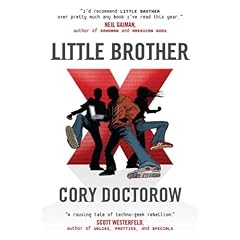
I just finished this great new novel written by Cory Doctorow of BoingBoing fame. Its a story about what might happen to a high school hacker living in SF if a terrorist attack blew up the Golden Gate Bridge and the Department of Homeland Security declared martial law in the city.
I enjoyed the story immensely, it kept me up late last night turning pages. The technology that Marcus, the main character and hacker of the story, used was almost as interesting as the plot itself, which says alot. Some of the technologies used were: TOR, a tool that allows users to surf the web and email each other anonymously, RFID chip neutralizers, gait analyzers, (ie motion detection analysis that could supposedly identify people by their gait--this was neutralized by putting some pebbles in ones shoe.) and ParanoidLinux, a free linux distro with an intense emphasis on personal privacy and security.
There are instructables of how to use all of these technologies here and the book is available for free download here



